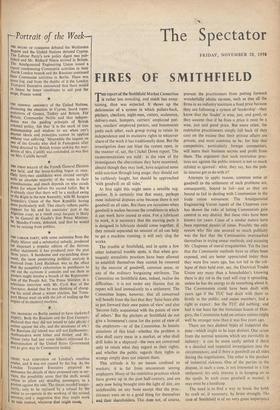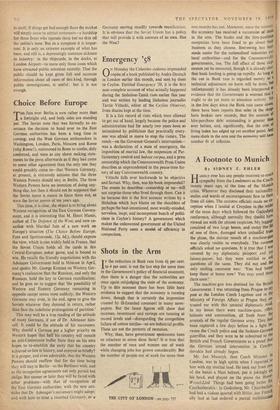FIRES OF SMITHFIELD
THE report of the Smithfield Market Committee is rather less revealing, and much less enter- taining, than was expected. It shows up the deficiencies of a system in which pullers-back, pitchers, checkers, night-men, cutters, scalesmen, delivery-men, humpers, carriers' employed por- ters, retailers' employed porters, and bummarees jostle each other, each group trying to retain its independence and its exclusive rights to whatever share of the work it has traditionally done. But the investigation does not blast the system open, in the manner of, say, the Crichel Down report. The recommendations are mild : in the view of the investigators the aberrations they have examined, absurd though they may look, have acquired some mild sanction through long usage; they should not be ruthlessly fought, but should be approached 'with goodwill on all sides.'
At first sight this might seem a sensible sug- gestion. It is certainly true that many, perhaps most industrial disputes arise because there is not goodwill on all sides. But there are occasions when goodwill is useless because the conditions in which it can work have ceased to exist. For a lubricant to work, it is necessary that the moving parts it is designed to lubricate should come together; if they remain separated no amount of oil can help to get a machine running; it will only clog the works.
The trouble at Smithfield, and in quite a few other industrial trouble spots, is that when gro- tesquely unrealistic practices have been allowed to establish themselves they cannot be removed by the exercise of goodwill, common sense, or any of the ordinary bargaining attributes. The Committee on Smithfield does, indeed, realise the difficulties : it is not under any illusion that its report will lead immediately to a settlement. The Committee hopes, however, that all concerned will benefit from the fact that they 'have been able to put forward their own points of view' and also 'become fully acquainted with the points of view of others.' But the pitchers at Smithfield do not give a bummaree's curse for the point of view of the employers—or of the Committee. In lunatic situations of this kind—whether the problem is who shall carry meat in a market, or who shall drill holes in a shipyard—the men are concerned only to retain what they regard as their rights; and whether the public regards their rights as wrongs simply does not interest them.
This attitude is by no means confined to workers; it is far from uncommon among employers. Many of the restrictive practices which have grown up in the past half-century, and are only now being brought into the light of day, are indefensible on any basis except that the prac- titioners were on to a good thing for themselves and their shareholders. This does not, of course, prevent the practitioners from putting forward wonderfully idiotic excuses, such as that all the firms in an industry maintain a fixed price because they are following a system of 'leadership'—they know that the 'leader' is wise, just, and good, so they assume that if he fixes a price it must be a wise, just and good price. But more often, the restrictive practitioners simply fall back (if they can) on the excuse that their private affairs are private, and must continue to be; for fear that competitors, particularly foreign competitors, will learn their business secrets and profit from them. The argument that such restrictive prac- tices are against the public interest is not so much refuted as ignored : what, they say, has the pub- lic interest got to do with it?
Attempts to apply reason, common sense or goodwill to the settlement of such problems are, consequently, bound to fail—just as they are bound to fail in dealing with Communism in the trade union movement. The Amalgamated Engineering Union report of the Chapman case has shown the risks of letting Communists gain control in any district. But these risks have been known for years. Cases of a similar nature have been reported dozens -of times. Possibly the only reason why this one secured so much publicity was the fact that the Communists overreached themselves in trying smear methods, and accusing Mr. Chapman of moral irregularities. Yet the fact that the Communist methods have so often 'been exposed, and are better appreciated today than they were five years ago, has not led to the col- lapse of their hold over, say, the Electrical Trades Union any more than a householder's knowing there is dry rot in the roof will stop it spreading, unless he has the energy to do something about it. The Communists could have been dealt with years ago if the TUC had dealt with them as firmly as the public, and union members, had a right to expect : but the TUC did nothing; and had it not been for the fortuitous lesson of Hun- gary, the Communist hold on certain unions might well be stronger now than it was five years ago.
There are two distinct types of industrial dis- pute—which ought to be kept distinct. One arises from the normal tensions which are inevitable in industry : it can be more easily settled if there is a detailed and impartial investigation into the circumstances; and if there is goodwill on all sides during the negotiations. The other is the product of industrial sickness. One of the parties to the dispute, in such a case, is not interested in a fair settlement; his only interest is in hanging on to the spoils. In such cases goodwill is wasted; it may even be a handicap.
The need is to find a way to break the hold, by craft or, if necessary, by brute strength. The case of Smithfield is of no very great importance in itself; if things get bad enough there the market will simply cease to attract customers—a hardship for those firms who operate there but no skin off the public's nose. But as a symptom it is impor- tant. It is only an extreme example of what has been, and still is, a depressingly common sickness in industry : in the shipyards, in the docks, at London Airport—to name only those cases which have attracted public attention recently. That the public should be kept given full and accurate information about all cases of this kind, through public investigations, is useful : but it is not enough.































































 Previous page
Previous page